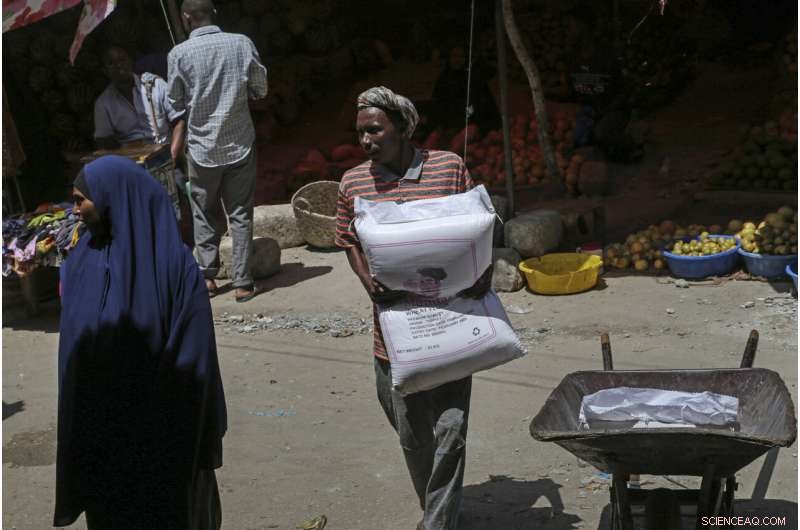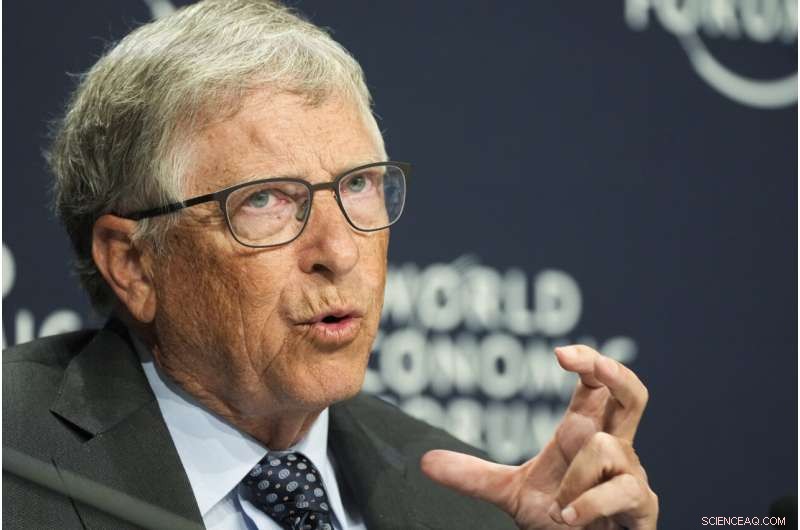
Un homme porte un sac de farine de blé importé de Turquie sur le marché de Hamar-Weyne dans la capitale Mogadiscio, en Somalie, le jeudi 26 mai 2022. Bill Gates a exhorté les dirigeants mondiaux à ne pas abandonner les objectifs qu'ils se sont fixés pour réduire la faim et la pauvreté malgré d'énormes revers récents documentés dans un nouveau rapport publié le mardi 13 septembre par la Fondation Bill et Melinda Gates. Crédit :AP Photo/Farah Abdi Warsameh, Fichier
Bill Gates affirme que la crise mondiale de la faim est si immense que l'aide alimentaire ne peut pas résoudre complètement le problème. Ce qui est également nécessaire, soutient Gates, ce sont les types d'innovations dans les technologies agricoles qu'il finance depuis longtemps pour tenter d'inverser la crise documentée dans un rapport publié mardi par la Fondation Bill et Melinda Gates.
Gates souligne, en particulier, une percée qu'il appelle les "graines magiques", des cultures conçues pour s'adapter au changement climatique et résister aux ravageurs agricoles. La Fondation Gates a également publié mardi une carte qui modélise la manière dont le changement climatique affectera probablement les conditions de croissance des cultures dans divers pays afin de souligner le besoin urgent d'agir.
En attribuant à la technologie un rôle prééminent dans la résolution de la crise alimentaire mondiale, Gates se met en désaccord avec les critiques qui disent que ses idées entrent en conflit avec les efforts mondiaux pour protéger l'environnement. Ils notent que ces semences ont généralement besoin de pesticides et d'engrais à base de combustibles fossiles pour pousser.
Les critiques soutiennent également que l'approche de Gates ne répond pas à l'urgence de la crise. Développer des "semences magiques" prend des années et ne soulagera pas immédiatement les pays qui endurent actuellement des souffrances généralisées parce qu'ils dépendent des importations alimentaires ou connaissent des sécheresses historiques.
C'est un débat qui pourrait intensifier la pression internationale pour atteindre les objectifs communs de prospérité et de paix mondiales, connus sous le nom d'objectifs de développement durable des Nations Unies, avant l'échéance de 2030. Les 17 objectifs incluent l'élimination de la pauvreté et de la faim, la lutte contre le changement climatique, l'accès à l'eau potable, la promotion de l'égalité des sexes et la réduction des inégalités économiques.
"C'est assez sombre par rapport à nos espoirs pour 2030", a déclaré Gates, 66 ans, dans une interview à l'Associated Press. Il a toutefois ajouté :"Je suis optimiste quant à la possibilité de revenir sur la bonne voie."
Gates a souligné que la guerre en Ukraine et la pandémie étaient les principales causes de l'aggravation de la crise de la faim. Mais son message aux autres donateurs et dirigeants mondiaux réunis pour l'Assemblée générale des Nations Unies en septembre est que l'aide alimentaire ne suffira pas.
"C'est bien que les gens veuillent empêcher leurs semblables de mourir de faim lorsque des conflits comme l'Ukraine interrompent l'approvisionnement alimentaire", écrit Gates dans le nouveau rapport. Mais le vrai problème, dit-il, est que de nombreux pays en situation d'insécurité alimentaire ne produisent pas suffisamment de leur propre nourriture, un problème qui sera certainement exacerbé par les conséquences du changement climatique.
"La température continue d'augmenter", a déclaré Gates. "Il n'y a aucun moyen, sans innovation, de se rapprocher ne serait-ce que de l'alimentation de l'Afrique. Je veux dire, ça ne marche tout simplement pas."
Comme il le fait depuis plus de 15 ans, Gates a appelé à investir dans la recherche agricole, mettant en évidence les semences de maïs qui se développent à des températures plus élevées et dans des conditions plus sèches que les autres variétés. Ces semences ont été développées dans le cadre d'un programme de la Fondation africaine pour les technologies agricoles à laquelle la fondation a donné 131 millions de dollars depuis 2008.
Depuis lors, la Fondation Gates a dépensé 1,5 milliard de dollars en subventions axées sur l'agriculture en Afrique, selon Candid, une organisation à but non lucratif qui étudie les dons philanthropiques. La Fondation Bill et Melinda Gates est à certains égards la plus grande fondation privée au monde et est surtout connue pour son travail sur la santé mondiale, y compris les vaccins. Il a commencé sous sa forme actuelle en 2000, après que Gates ait quitté son poste de PDG chez Microsoft, le géant de la technologie qu'il a cofondé. Forbes estime sa valeur nette à environ 129 milliards de dollars.
The foundation's spending on agricultural development is why Gates' view on how countries should respond to food insecurity has taken on heightened importance in a year when a record 345 million people around the world are acutely hungry. The World Food Program said in July that tally represents an increase of 25% from before Russia invaded Ukraine in February and a 150% jump from before the pandemic struck in the spring of 2020.
In Ghana, field trials for four varieties of modified seeds began in 2013. But only this past summer has one been approved for commercialization, said Joeva Rock of the University of Cambridge. Activists there, she said, have asked whether those resources could have been better spent elsewhere.
"What would happen if those went into increasing funds to the national research centers in Ghana, to building roads, to building storage, to building silos or helping to build markets?" said Rock, who has written a book about food sovereignty in the country.
When asked, Gates acknowledged the importance of infrastructure like roads and other transportation systems.
"If you want your inputs like fertilizer to come in, if you want your output to go out, it's just too expensive in Africa without that infrastructure," he said, adding that building and maintaining roads is highly expensive.

Bill Gates, Co-Chair, Bill &Melinda Gates Foundation, speaks at a news conference during the World Economic Forum in Davos, Switzerland, Wednesday, May 25, 2022. Gates urged world leaders not to give up on the goals they set to reduce hunger and poverty despite huge recent setbacks documented in a new report released Tuesday, Sept. 13 by The Bill and Melinda Gates Foundation. Credit:AP Photo/Markus Schreiber, File
Some researchers question the wisdom of pursuing the fundamental premise that Gates has embraced:Increasing agricultural production through the use of modified seeds along with fertilizers and pesticides. They point to the environmental footprint of industrial agriculture, including the use of fossil fuel-based fertilizers, the degradation of soil quality and the diminishing of biodiversity.
Alternatives could include agroecological interventions, like developing locally managed seed banks, composting systems to promote soil health and pesticide interventions that don't rely on chemicals, experts said. Over time, those approaches can reduce the need for food aid and build more resilient farming systems, according to Rachel Bezner Kerr, a professor of global development at Cornell University.
Kerr, a lead author of the food chapter of the latest report from the International Panel on Climate Change, said that while the panel doesn't make recommendations, "overall, the kind of focus on a few technologies and reliance on fossil fuel-based inputs isn't in line with ecosystem-based adaptation" or a biodiverse future.
Mark Suzman, CEO of the Gates Foundation, defends its approach warning that limiting access to fertilizers means farmers cannot increase their yields.
"Fertilizer is necessary. You simply cannot meet the overall productivity gains without it," Suzman said, speaking on a call with reporters.
In his interview with the AP, Gates himself dismissed criticisms of the foundation's emphasis on modified seeds.
"If there's some non-innovation solution, you know, like singing 'Kumbaya,' I'll put money behind it," Gates said. "But if you don't have those seeds, the numbers just don't work." He added, "If somebody says we're ignoring some solution, I don't think they're looking at what we're doing."
Another project the foundation has funded is the development of computer models that try to measure crop loss caused by disease or pests. The idea is to direct research and responses to where they are needed most.
"It's not just, how do we get through this crisis and get back to normal? It's, what does the future normal look like?" said Cambria Finegold, the director of digital development for CABI, an intergovernmental nonprofit that is developing the models.
Melinda French Gates, the other co-chair of the Gates Foundation, highlighted in a separate letter the halting progress toward gender equity worldwide. Since January, the foundation has expanded its board, adding six new members to help direct its work, a move that followed the announcement of the Gateses' divorce last summer.
French Gates has agreed to step down after two years if the two decided they could not continue to work together. French Gates, who also founded an investment organization called Pivotal Ventures, was not available for an interview.
Gates said he is lucky that his former wife has continued to put her time and energy into the foundation. In July, Gates said he would contribute $20 billion to the foundation in response to the significant setbacks caused by the pandemic, raising its endowment to approximately $70 billion.
Through his giving, investments and public speaking, Gates has held the spotlight in recent years, especially on the topics of vaccines and climate change. But he has also been the subject of conspiracy theories that play off his role as a developer of new technologies and his place among the highest echelons of the wealthy and powerful.
Gates said he does not spend time thinking about conspiracies and that his foundation's work has nothing to do with his personal reputation.
"If you go into these countries, they've never heard of me or the foundation," Gates said. "Maybe in the rich world somebody is reading some internet thing, but the people we care about have never, will never, and it's not important that they ever know who I am."
© 2022 L'Associated Press. Tous les droits sont réservés. Ce matériel ne peut être publié, diffusé, réécrit ou redistribué sans autorisation. Gates:Foundation to invest $5B in Africa over next 5 years